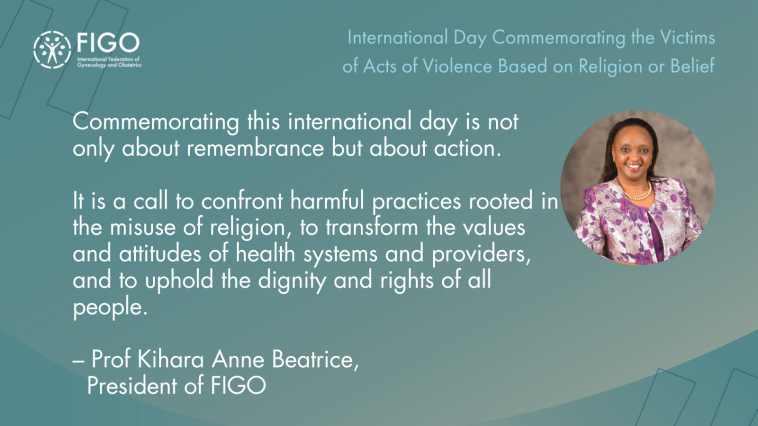Marking the International Day Commemorating the Victims of Acts of Violence Based on Religion or Belief

The International Day Commemorating the Victims of Acts of Violence Based on Religion or Belief is a solemn reminder of the devastating consequences of intolerance, discrimination and targeted violence rooted in faith or ideology. For FIGO, whose mission is to advance the health and rights of women and girls everywhere, this day holds deep relevance.
Violence based on religion or belief does not impact everyone equally. Women and girls are often disproportionately affected, subjected to forced marriage, rape, trafficking, denial of contraception and restrictions on their reproductive health. In many settings, religion is misused to justify control over women’s bodies and autonomy, intensifying cycles of inequality and suffering. Men and boys, too, are harmed – often through forced recruitment into extremist groups or direct exposure to violence – while individuals who belong to minority faiths, LGBTQ+ persons and those seeking reproductive autonomy face the compounded effects of double marginalisation.
FIGO recognises that such harms are often rooted in deeply entrenched social, cultural and religious norms. Addressing these requires more than policy change, it requires transformation at the level of values and attitudes. Through Value Clarification and Attitude Transformation (VCAT), FIGO equips health professionals to reflect critically on their own beliefs and biases, particularly where religious or cultural values risk hindering the provision of comprehensive, rights-based sexual and reproductive health services. This process supports health workers to uphold medical ethics and human dignity while engaging with communities in ways that are respectful, inclusive and culturally sensitive. At the same time, FIGO actively engages with gatekeepers that include faith leaders and community influencers to challenge stigma, promote dialogue and foster environments where women and girls can access the care and protection they deserve.
Above all, FIGO emphasises that dignity is non-negotiable. Every individual, regardless of religion or belief, has the right to be respected, to live free from violence and to access the full range of health and human rights – including sexual and reproductive health. Denying a woman access to safe childbirth care, contraception or post-violence treatment not only violates her health rights but also undermines the broader principles of freedom of thought, conscience and belief. Protecting women and children from gender-based religious violence – whether through forced conversion, child marriage, or so-called honour crimes – must be a global priority.
Through its committees and strategic plan, FIGO is committed to advocating for sexual and reproductive health (SRH) services that are free from discrimination, supporting survivors of violence with trauma-informed care, and strengthening the evidence base on how religion and belief intersect with health outcomes.
FIGO also works with interfaith partners to amplify messages of peace, justice and equality, ensuring that no faith or belief system is weaponised to justify harm against women and girls.
Commemorating this international day is not only about remembrance but about action. It is a call to confront harmful practices rooted in the misuse of religion, to transform the values and attitudes of health systems and providers, and to uphold the dignity and rights of all people. For FIGO, this includes an unwavering commitment to ensuring that women and girls everywhere have safe, equitable access to SRH services – because to deny this is to deny humanity itself.